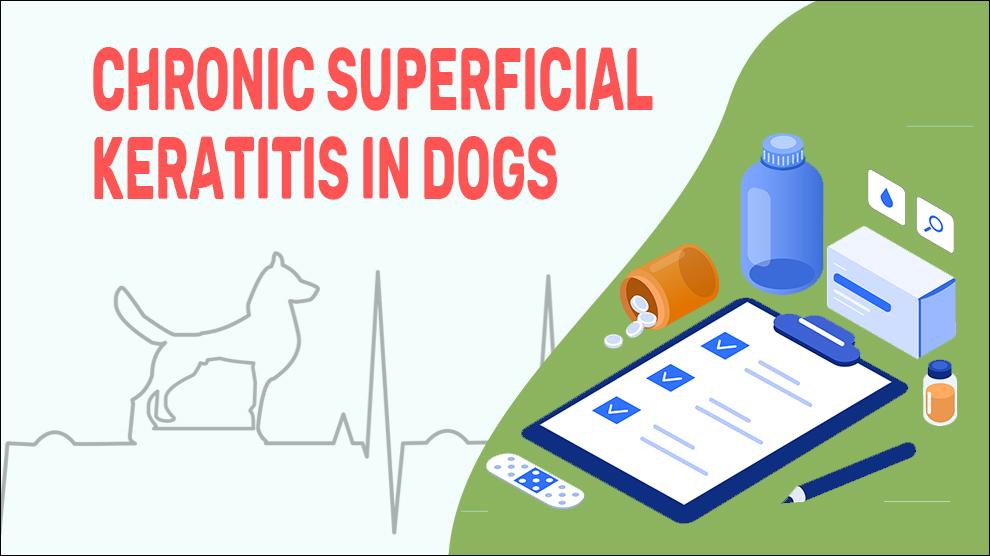Chronic Superficial Keratitis (CSK) in the dog is a progressive, bilateral, inflammatory, autoimmune condition of the cornea and conjunctiva due to the migration of pigmented melanin granules onto the cornea associated with chronic inflammation. This is a frequent cause of blindness in brachycephalic dogs.
Also called Uberreiter's disease or pannus, this is a clinical condition in which infiltration of inflammatory cells to various corneal layers in response to harmful stimuli, such as own-antigens or contagious exogenous agents. The inflammatory response may cause corneal edema, infiltration of inflammatory cells, vascularization, corneal pigmentation, and cloudy opacification (grayish or white).
Initially, a prominent, non-painful pink mass appears on the cornea, most commonly on the centrotemporal or temporal limbus. The mass will often be found in the one to four o'clock position on the left eye or the eight to eleven o'clock position on the pet's right eye.
Usually, both eyes are affected but one may appear worse than the other. In 75% of cases, the third eyelid is affected in tandem having a solidified, Conjunctival hyperemia margin with a raised irregular conjunctival surface and multifocal depigmentation.
Symptoms Of Chronic Superficial Keratitis
Initial Stage:
- Excessive blinking
- Painful, red, and irritated eyes.
- Mucoid to mucopurulent ocular discharge.
Intermediate Stage:
- Corneal ulceration
- Corneal scarring
- Conjunctival hyperemia
- Secondary bacterial infections may also occur.
Final Stage:
- Hyperpigmentation
- Corneal perforation
- Neovascularization
- Fibrosis
- Blindness
Treatment Options For Chronic Superficial Keratitis
The objective of CSK treatment is two-fold: To improve function and prevent further corneal damage.
Treatment can be divided into two modalities - medical and surgical.
Surgical procedures to remove a pigmented section of the cornea are mostly not beneficial due to the recurrence factor.
Sometimes, immunosuppressive therapy (medications that suppress the immune system) with corticosteroids may be necessary.
- Artificial tear drops are used. Artificial tear drops substitutes are hyaluronic acid, polyvinyl alcohol, polyvinyl pyrrolidine, and methylcellulose.
- Immuno-modulating drugs such as Cyclosporine A (CsA) - CsA disrupts the immune-mediated reaction against the cornea, conjunctiva, and lacrimal glands. Even for normal eyes, it acts as a lacrimomimetic agent and has an anti-inflammatory effect too.
- Noncytotoxic immunosuppressants - Pimecrolimus, and Tacrolimus.
- Acetylcysteine: A mucolytic agent to treat mucin excess on the ocular surface.
- Dog sunglasses (e.g., Doggles) may be suggested for pannus caused by UV lighting.
Home Remedies For Chronic Superficial Keratitis
Gently washing the eyelids using baby shampoo and/or applying warm compresses to the eyes can help discharge the oil in the tear glands.
Pet eye lubricating gels are another option (best to apply at night or before bedtime).
Supplementing for healthy eyes - Help your dog have healthy ocular hygiene with supplements.
Make your dog more comfortable: Cleanse eyelids - to remove crusts (dried discharge) with lukewarm water with a half-teaspoon of salt.
Use physiological saline or a commercial eye cleansing agent: (such as Eye Scrub) or lactated Ringer’s solution.
Prevention Of Chronic Superficial Keratitis
Check your dog on a regular basis and consult your veterinarian immediately if you find any odd changes in eye color associated with a dark film across them.
Affected Breeds Of Chronic Superficial Keratitis
Bloodhound, Bulldog, Cavalier King Charles Spaniel, Lhasa Apso, Miniature Schnauzer, Pug, Pekingese, Shih Tzu, Samoyed, Yorkshire Terrier, German Shepherd, Greyhound, Siberian Husky, Belgian Tervuren, Belgian Shepherd, Border Collie, Middle Age Dogs
Additional Facts For Chronic Superficial Keratitis
- Causes:
A. Autoimmune Keratitis:
- Immune-mediated: Predominant cause.
- Few breeds are genetically predisposed to CSK, while a specific genetic mutation has not been identified.
B. Noninfectious Keratitis:
- Tear deficiencies, aberrant hairs, and poor eyelid closure.
- Ultraviolet Radiation
- Metabolic: Hypothyroidism and Diabetes mellitus
- Dogs living in higher elevations.
- Neurogenic: Middle-aged female dogs - associated dry / crusted ipsilateral nostrils.
- Iatrogenic: In the case of “cherry eye”, surgical removal of the gland of the third eye.
- Types:
Infectious Keratitis - An infection caused by fungi or bacterium results in inflammation of the cornea. Prominent symptoms are Eye redness, Excessive tearing, Eye discharge, etc.
Ulcerative Keratitis - Inflammation due to a trauma/injury to the cornea surface, can lead to the cornea stroma. Squinting, Excessive tearing, Sensitivity to light, etc.
Chronic Superficial Keratitis (also called pannus) - This is an autoimmune, progressive, inflammatory condition of the cornea. Usually affects Border Collies, Labrador Retrievers, German Shepherds, and Greyhounds.
- Morbidity:
Chronic superficial keratitis Incidence in dog population data is not available.
- Mortality:
There is no mortality due to this condition documented yet.
- Diagnosis:
- Schirmer Tear Test (STT).
- Fluorescein Staining Test
- Tonometry
- Aesthesiometry
- An electroretinogram
- Ultrasound
- Prognosis:
CSK isn't a lethal condition, but it can ultimately lead to eye problems. Discuss with your vet to figure out the underlying cause.
Depending on the cause, CSK can be treated with either medication to keep the eyes moisturized or surgery.
When To See A Vet
Contact your vet right away, if you notice any of the following:
- If your dog blinks excessively or the eyes look painful and red continuously.
- Watery discharge / Excessive tearing
Food Suggestions For Chronic Superficial Keratitis
The diet should be included foods containing vitamins A, C, omega 3s, zinc, carotenoids, beta-carotene, lycopene, and antioxidants.
- Omega-3 oily fishes such as salmon, tuna, cod, etc.
- Leafy greens such as spinach, kale, watercress, etc.
- Nonmeat/plant protein sources such as nuts, Lentils, Beans, Eggs, etc.
- Citrus fruits or juices, Sweet potatoes, tomatoes, pumpkin.
- Zinc foods such as Pork, tuna, and Oysters.
- Blueberries, Broccoli, cabbage, carrots, etc.
Conclusion
For pets with CSK, Early diagnosis with prompt treatment, as well as routine follow-up examinations is of paramount importance. In most dogs, the prognosis can be excellent with the maintenance of vision and long-term comfort.

















